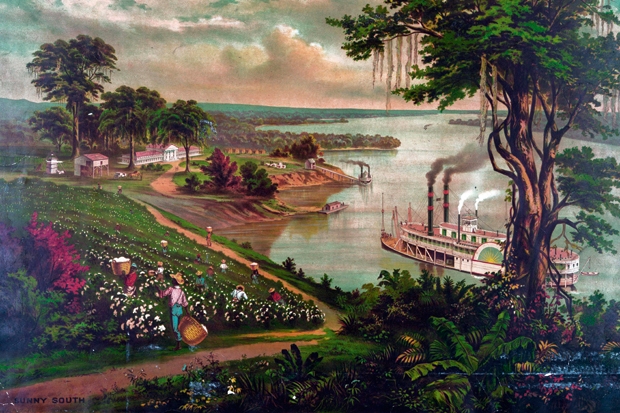If not for cotton, we would still be wearing wool. To equal current cotton production, we would need seven billion sheep, and a field 1.6 times the area of the EU. Capitalism has spared us this itching, bleating nightmare. But capitalism, Sven Beckert writes in his hair-shirted history, Empire of Cotton, has wrought other horrors.
For medieval Europeans, cotton was a luxury import. Prices fell as Europe’s maritime empires bypassed the Ottoman middleman. They fell further after the 1780s, when the East India Company increased its imports, and British inventors developed water-powered spinning machines. Cotton became the first global commodity, woven into the ‘triangular trade’ that shuttled African slaves to New World plantations, New World materials to Europe, and finished goods from Europe to imperial markets.
These exchanges drew the cotton economy away from the coasts of south Asia and towards the Atlantic. In Britain, they turned Manchester into ‘Cottonopolis’, and created a class of ‘cotton capitalists’ who reinvested their profits in the Industrial Revolution. Their business also fuelled the growth of state power. In mercantilist style, government and private capital collaborated: Royal Navy ships escorted the private fleets of the East India Company.
When it comes to washing capitalism’s dirty laundry, nothing bloodies the water like ‘white gold’. Beckert calls mercantilism ‘war capitalism’, and violence the ‘fundamental characteristic’ of its ‘project’. This is polemical, and woolly. The 18th-century British state grew by war, and its economy by cotton, but the interests of ministers and merchants were not identical, and rarely formed a coherent ‘project’. Most of Britain’s wars were against France, not for cotton. Many of Britain’s clients in African slavery and Indian cotton were willing partners. Between 1780 and 1815, as Britain took control of the global cotton market, the state acted repeatedly against the cotton interest and its political connections: in the India Act of 1784, in the impeachment in 1788 of Warren Hastings, and, in 1807, by abolishing slave trading in the British empire. Beckert does not mention these theoretical anomalies.
By 1861, raw cotton constituted 61 per cent of American exports. Slaves picked 80 per cent of the cotton spun in British mills: while the British state interdicted slave ships, its merchants profited at one remove. Slavery, Beckert writes, was central to ‘the most dynamic and far-reaching production complex in human history’ — and in conflict with the ‘free land and free labour’ principles of the industrialising northern states. The outbreak of the American civil war caused a global panic, and riots in Lancashire. Yet the empire of cotton survived the dethronement of King Cotton. Imports from India and Egypt made up the deficit, and mechanical spindles reduced production costs.
The cotton economy rebuilt itself for industrial capitalism. Aided by the railroad, American cotton production thrived. Enfranchised slaves became share-croppers and mill hands. In 1861, the southern states had only produced cotton. In 1910, they were the world’s third largest cotton manufacturing area, after Britain and the northern states. Meanwhile, rising demand led to the implantation of modern production methods in Central Asia, Korea, West Africa and India.
As strikes and unionisation raised labour costs in America and Europe, cotton production swung back to Asia. Industrial cotton, a mainstay of capitalism, became the hope of the anti-imperialists. The West had lost its monopoly on ‘dark, satanic mills’, and so had capitalism. Gandhi, copying the northern abolitionists of the 1850s, had donned homespun linen to escape the cotton economy, but the spinning wheel became only a symbol on the Indian flag. In the 1950s, India’s socialist planners imitated capitalist infrastructure, while failing to emulate the variety or quality of its products. Nasser’s ‘Arab socialism’ did little better in Egypt, and the communists in Russia and China did much worse. Beckert describes their vicious bumblings as ‘a sharpening of tools and an enhancing of the methods of industrial capitalism’.
Today, half the world’s cotton is grown in China and India, and 80 per cent of it is processed in Asia. Heavily subsidised American farmers grow 14 per cent of the global supply. The mills of America and Europe are derelict, or repurposed as lofts and museums. Oil, having outstripped cotton as a commodity, is replacing cotton as a fabric, too: the market in petroleum-based synthetics is worth twice as much as the cotton market.
Still, cotton production is expected to quadruple by 2050. If we revert to wool, that means 28 billion sheep, and a field six times larger than the EU. ‘Capitalism,’ Beckert confesses, ‘has never been matched by any other system of production.’







Comments